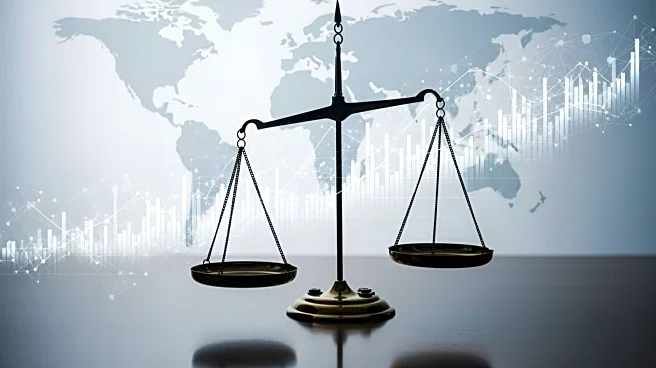What's Happening?
The U.S. stock market faced volatility on Thursday as traders navigated corporate earnings, trade tensions, and a government shutdown. The S&P 500 and Nasdaq Composite both traded lower by 0.7%, while the Dow Jones Industrial Average lost 317 points.
The decline coincided with a spike in the Cboe Volatility Index and moves in bond yields and the U.S. dollar. AI stocks, which initially led gains, saw declines, with Broadcom and Nvidia remaining mostly unchanged. Consumer stocks like Walmart and Costco fell nearly 3%. Regional banks Zions and Western Alliance also experienced significant drops due to concerns over bad loans and fraud allegations.
Why It's Important?
The market's volatility reflects broader economic uncertainties, including trade tensions between the U.S. and China and the ongoing government shutdown. These factors contribute to investor anxiety, impacting stock performance across various sectors. The decline in regional banks highlights potential risks in lending practices, which could affect financial stability. Additionally, trade tensions, particularly President Trump's tariff threats, could influence global trade dynamics and economic growth. The market's response to these developments underscores the interconnectedness of political actions and economic outcomes.
What's Next?
Investors will continue to monitor corporate earnings reports for insights into company performance and economic health. The ongoing government shutdown may lead to delays in economic data releases, complicating market analysis. Trade tensions between the U.S. and China remain a critical factor, with potential policy changes affecting market sentiment. As the earnings season progresses, market participants will assess the impact of these factors on stock performance and broader economic trends.
Beyond the Headlines
The current market conditions highlight the influence of political decisions on economic stability. President Trump's trade policies and the government shutdown demonstrate how political actions can create uncertainty and volatility in financial markets. This situation may prompt investors to seek safer assets or diversify portfolios to mitigate risks associated with political unpredictability.
















